#task: zimbabwe
Text
African Social Spiders: these spiders live in colonies that can contain up to 2,000 spiders, most of which are female; they hunt, forage, maintain their web, and raise their offspring as a group, without any dominance hierarchy or caste system
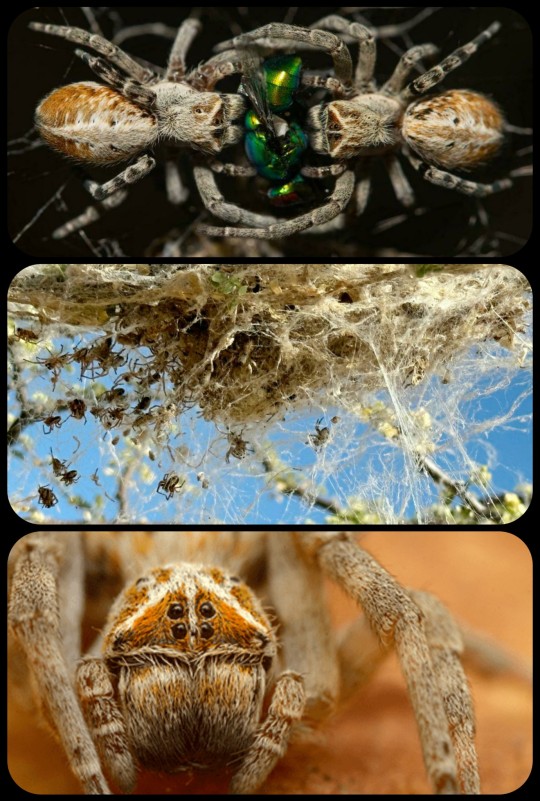
This communal behavior is extremely rare among spiders, which are normally solitary creatures. The African social spider (Stegodyphus dumicola) is one of the few species that has been identified as a true "social spider," forming colonies and living in communal nests where the spiders work together to hunt, forage, build webs, and care for their offspring.
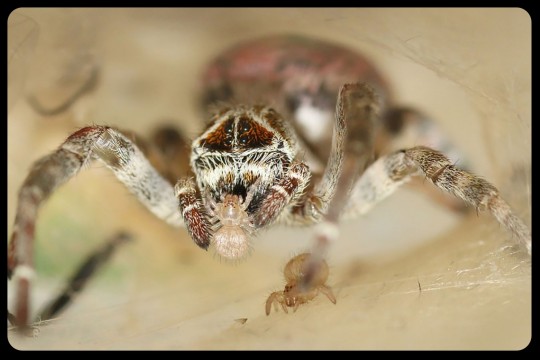
Above: an African social spider feeding the young spiderlings of her colony by regurgitating food for them, exhibiting a level of maternal/allomaternal care that is relatively uncommon in both spiders and insects
African social spiders can be found in various parts of southwestern Africa, where they will often build a dense silk nest in the branches of a thorn tree and/or shrub. Most of the spiders in the colony are female (more than 85%, according to some studies) and the species itself also has a female-biased primary sex ratio, as researchers have found that female embryos develop in more than 80% of the eggs that the spiders produce.
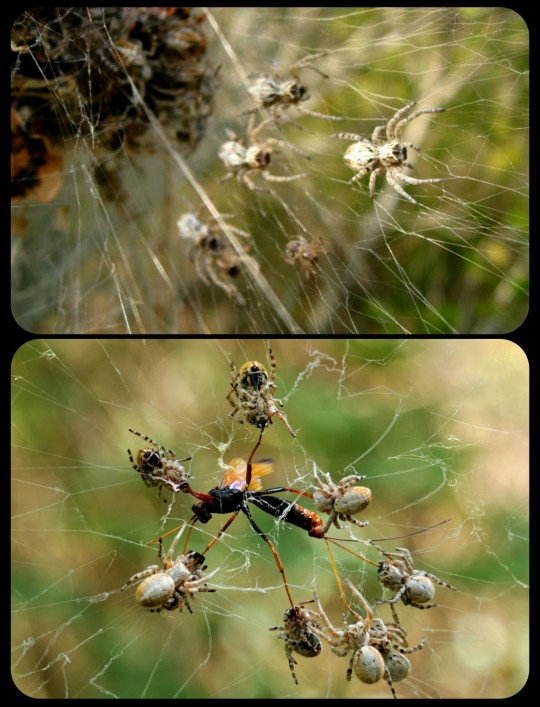
Above: a group of African social spiders working together to subdue their prey, which will be taken back to the nest so that it can be shared with the rest of the colony
There is no evidence that any dominance hierarchy or caste system exists within S. dumicola colonies. The spiders all cooperate to complete a variety of tasks, such as hunting, repairing the web, foraging, defending the colony, caring for the colony's offspring, etc. While none of them are exclusively assigned to a single task, many have a primary role that they fill, often based on their physical size and condition.

Above: close-up photo of S. dumicola
This species also engages in extreme allomaternal care, meaning that many different spiders (including both mothers and "allomothers") all share the responsibility of caring for the colony's offspring; even the unmated females help out with brood care. The mothers/allomothers tend to the eggsacs, regurgitate food for the baby spiderlings, and even engage in matriphagy, which means that they will eventually be cannibalized by the babies.
From The Encyclopedia of Animal Behavior:
... some proportion of females do not reproduce – sometimes as much as 60% – but remain as helpers, contributing to foraging and brood care (allo-mothering). Both breeding females and virgin allo-mothers regurgitate food for colony offspring and eventually let the young consume their bodies. ...
Young that are raised with both mothers and allo-mothers show higher survival and growth than young raised by their mothers alone, suggesting a clear fitness benefit of cooperative breeding.
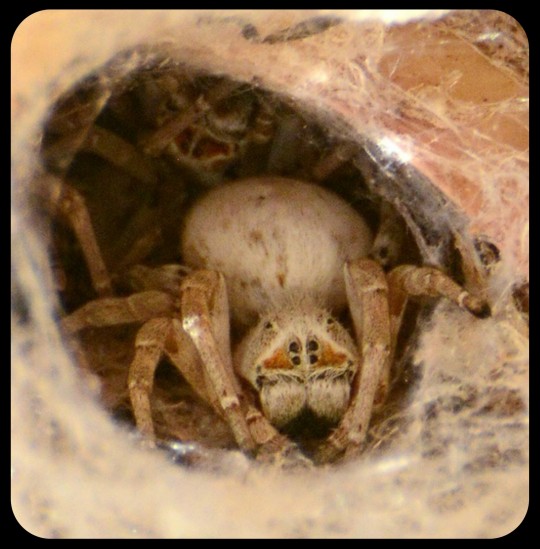
Spiders of this species generally measure about 2.5 - 3.5mm long; they can be found in Namibia, Botswana, Zimbabwe, South Africa, Lesotho, and Eswatini.
Sources & More Info:
Science Direct: Social Spiders
Current Biology: Quick Guide to Social Spiders (PDF)
Phys.org: Untangling the Social Lives of Spiders
Proceedings of the Royal Society B: The Age & Evolution of Sociality in Stegodyphus Spiders
Entomology Today: Social Spiders Divide Labor According to Body Size & Condition
Animal Behaviour: Extreme Allomaternal Care by Unmated Females in a Cooperatively Breeding Spider
National Geographic: Baby Spiders Eat their Mothers
University of Portsmouth: Social Spiders Have Different Ways of Hunting in Groups
Behavioral Ecology: Spider Societies Mitigate Risk by Prioritizing Caution
Behavioral Processes: Warring Arthropod Societies
Behavioral Ecology and Sociobiology: Does the African Social Spider Stegodyphus dumicola Control the Sex of Individual Offspring?
#arachnology#spiders#african social spiders#stegodyphus#dumicola#arthropods#arachnids#allomaternal#matriphagy#communal spiders#social spiders#cool bugs#animal facts#tw arachnophobia#cw spiders#anarcho-feminism?#more like arachno-feminism#just a bunch of radfem commie cannibals
224 notes
·
View notes
Photo

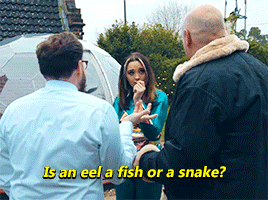




TASKMASTER 14x01 • The Chassis, The Wings
So in Zimbabwe, we used to have nine gardeners, okay? Now it's not because we're bougie, it's because that's a done thing. So basically my dad was like, "Look I can't afford all these gardeners. Too many, yeah? We need to rank them." So he put me in charge of ranking them. I would give them tasks, like I was a Zimbabwe Taskmaster, and one of them was to make me a bow and arrow. So the person who made me the bow and arrow was the top gardener.
#taskmaster#taskmasteredit#Sarah Millican#John Kearns#Fern Brady#dara o briain#munya chawawa#Alex Horne#Greg Davies#gif#s14#14x01#s14 spoilers#taskmaster spoilers#*#TMEveryEp
355 notes
·
View notes
Text
Regarding the H.I.V.E. birthday bundle, specifically my less-than-satisfactory contribution to it:
(Under a cut because I estimate this to be about 1000 words).
The shortest way I can say this is "sorry."
In a longer form, I acquknowledge that Wing is a beloved, respected character of the H.I.V.E. series, becoming a favourite of many, and ranking highly in the minds of everyone else. If anyone deserved better treatment in this event, it was undoubtedly him, not to mention the real-life disappointed H.I.V.E. fandom.
I also acquknowledge that this was probably the largest communal event since the release of Bloodline three years ago and that the date on which it was announced was long enough ago to counter any explanation I could possibly give, especially since I, as a minor, have more time to commit to any one project than an adult burdened with full-time employment and more significant responsibilities than I. Yet I shall offer one regardless and leave the perception of my character at the mercy of your own individual judgements. It is as follows:
Some of you might remember me directing a post to an "anon" threatening me in January, which I have since deleted. This is actually not a recent or isolated issue- not even for my blog, although I doubt that anybody remembers her posting so-called "edgy" stuff on it back in like 2019. But if you do, fun fact: it was the same person. This person used to be my friend, then a "girlfriend" and is now something of an enemy. As well as threats, there has been blackmail and cases of physical violence committed against both me and my other friends. The reason I bring this up is because she followed me to the store I worked at sometime mid Feburary and provoked me there too. I was stupid, I shouted at her, and I was rightfully fired as a result. And the reason I mention this at all is because it has been hell finding a new job, eating up the time I had specifically set aside for this project.
Then, the entirety of March I more or less dedicated to finally reading bloodline (I read it twice more after my initial "live react" posts so I could actually get the juice out of it).
On the 23rd of March, my cat died, and to be brutally honest, I spent the entirety of April not doing anything that wasn't complete brainrot (hence the surge in my blog activity 💀).
May brought with it UCAS exams (UCAS points being what you need in the UK to get into university).
June brought the results, one of which was a C in physics, a grade that my school, family, and peers viewed as an unforgivable failure. As such, I had devices as well as other "distractions," including my books, taken away until the end of July so I could focus on resitting everything. Additionally, I was forced to go to school two hours early for extra lessons, given hour long detentions until the end of the academic year and had to have random meetings during my breaks to really rub in how stupid I am (no exaggerations are being made here; my head of year managed to drag calling me the r slur into a forty minute rant on one occassion).
Then, in August, my uncle got into a car accident and requested that myself and my parents fly over into Zimbabwe to help him. Fair enough, but in the time it had taken us to get over there, the man had gone off-grid (as he has a habit of doing) and we still have no clue of his whereabouts.
I promise I will make amends, and the only path I can see heading towards this objective is completing and redoing what you have seen for this project alongside a few other elements I had planned to incorporate into it. To be more specific, I will:
- Finish the birthday bundle.
I'm sure you've noticed that the "playlist" and "prompts for you" categories are missing from my offering. This will be rectified, and I will add these to the original birthday bundle post so it can be completed. I had elected to avoid those categories as I figured that having a few tasks done to a "rushed and painfully mediocre" standard would be better than having a small amount of awful content for each element of the bundle. The reasons why those two categories were chosen to be neglected were that a) no music I know at all aligns with Wing and b) I had not noted that the "prompts for you" was an existing section and only remembered when reading through the example Otto post, meaning I had not left myself enough time to sit with and revisit ideas to see if they really were any good. Additionally, that fanfic is nowhere near finished. I do plan to edit the published chapter and then continue it, and I shall try my best to stick to frequent, regular updates of a higher quality and quantity than I have presented you with thus far.
- Improve what I have given you
I plan to drastically improve my digital art for each "mini" picture that's in my work- you can see that there's a very, very good reason why I kept them all mini. When I'm done, they will be transformed into something that can at least be posted at their full size without risking the health of your eyes.
- Add to what I've given you
I know I've done very few headcanons, so I'll be sure to focus on Wing for future ones that I'll publish on my blog. In all likelihood, the next post of mine will be a much longer list of Wing headcanons. And even if it is not next, it will still hopefully be in the near future.
My initial plan for the "Wing art" was to make a rudimentary physical model of him. I can't promise it'll be of high quality since the last time I did this, I was four years younger, working with better materials, working without keeping it a secret, and crafting the fox emoji rather than an entire person. I also can't see how the colour green, which is what I was assigned, will fit in. But I'll do it anyway.
Something that I played with a bit while waiting for the prompts to be given out was character art. Currently, I have WIPs for Shelby and Laura and have posted a Ms Leon. I want to do something for every character, and Wing will most certainly be included in that, so I promise I'll take extra care to do him justice when I get around to him. Consider it to be like a non-picrew alternative to the cover image.
I also have a physical drawing in the works, though I confess this too shall probably take a while in the interest of refining skills before applying them so I don't waste the one piece of sketch paper I bought.
Once more, I am so extremely sorry for what I have done, and I will ensure that never again shall this height of inadequacy be reached and inflicted onto people who deserve so much better.
Thank you for reading
2 notes
·
View notes
Photo




nico parker, born 2004, 75% English/Cornish/British Isles, 25% Shona Zimbabwean
note: avatars for @taskweekly’s TASK 021: BLACK FACECLAIMS, TASK 078: ZIMBABWE, TASK 137: MOZAMBIQUE, TASK 273: SOUTH AFRICA
#tasksweekly#nico parker#nico parker 400x640#nico parker avatar#400x640#avatar#rpg#rpg ressources#faceclaim#faceclaim suggestions#underused faceclaim#rpg faceclaim#forumactif#polish rpg
13 notes
·
View notes
Text
Friday 26th April 2024
Yet another early morning kickoff today. Up with the lark, down to the jetty and ready with our seafaring friends from Philadelphia to embark on the good ship that'll convey us down the Chobe River with the stunning vista of sunrise across the water. And what a stunning sunrise it was! Immediately having cast off and the solar powered craft inched out into the calm waters the chorus began. Initially it was the guinea fowl that were agitated sensing danger, then a whole line of waterside trees began to erupt as the baboons screeched and lept from branch to branch. They sensed danger; most likely lion Bella said. The theory they have is that if sufficient vocal dissent is voiced, the lion will shrug and say okay, I get it, and move off to shop for breakfast elsewhere. The whole routine probably lasted 20 minutes or so, and then peace and tranquility returned and baby baboons continued playing, mother's suckled babies and others turned to the serious task of securing a future generation.
Others were also up and about by now. Crocs were serenely sailing along the shore, breakfast in mind. African Fish Eagles had taken position high aloft in the trees, and the African Darter fish eater was observing and diving, his pointed bill and thin long neck appearing out of the water like a javelin. Yes, the new day had dawned and life was beginning its cycle once again.
We moved on from this lovely place today being picked up and taken to Victoria Falls for the next chapter in our holiday. Botswana is such a beautiful place and the people from this land are so pleasant. The Chobe Game Lodge is excellent in every way and we feel so privileged to have stayed here and shared just a little of their country and way of life.
A most touching symbol of reconciliation is the Botswana national flag; black, white and blue. The black and white representative of colour/ race and joining together under the blue African sky.
Still no leopard!
Dan pulled up on schedule outside of the Lodge reception area and loaded our bags into the Toyota and told us he was to take us to the Zimbabwe border where he would leave us to be collected on the other side and taken to Victoria Falls Hotel for the next stage of our holiday. We skidded along the sandy track roads, nearly colliding with a herd of elephants making their way to the river and joining about 100 others then just a few yards further a male lion snoozing and then to the exit to Chobe National Park. One hour to the border and an hour to Victoria Falls in deepest Zimbabwe. To enter Zimbabwe it was necessary to pay for a visa in whatever currency you like but US dollars cash preferred. The Zimbabwe economy it would seem has crashed, and funds are needed from somewhere. The odd thing was that we were charged $55 each whereas American tourists are charged $35. And so it was that we crossed the border into a very scruffy compound, scooped up into a very nice mini bus and whisked off out of it leaving a trail of dust behind. Zimbabwe has 80% unemployment around here with an unpopular government secured by the military. It does not appear to be a nice place to live. By contrast our hotel, the Victoria Falls Hotel, built 1904 in a luxurious colonial style, served by British royalty in the past and having floor to ceiling portraits of George V and Queen Mary is diametrically opposite to the poverty in surrounding suburbs. Registration was in the premier lounge which saved us having to hang around the front desk, after which we were led up a grand staircase to our suite overlooking the grounds and the Falls in the distance. There is of course the fine dining restaurant: The Livingstone. Then there's also the Jungle Junction Restaurant which was introduced as having a lavish menu with lavish choices etc. Every time he said lavish, I could hear the sound of a cash register!
We had time to relax a little before being collected for our evening trip on the Zambezi river. Collectively we made up a small party of about a dozen on a little boat which set sail promptly at 4.30 with a view to seeking out yet more wildlife whilst consuming canapes and a sundowner or two or three. Well it was very jolly and we managed several hippos of many sizes, an open billed stork (it was a stork with an open mouth), a light crowned lapwing and a kingfisher. The boat took us along one side of the Zambezi and returned on the opposite bank which is Zambia.
Back to the hotel and a buffet meal of many delicacies such as crocodile! Whilst eating we had fantastic entertainment from local black artists performing traditional African song and dance. It was so good and it made us feel we really are in Africa! We started the day in Botswana for sunrise and observed a beautiful sunset in Zimbabwe ending a perfect day.
ps Tomorrow we shall be collected early for our tour of the Victoria Falls. Apparently you may get wet!
pps Crocodile tastes a bit like chicken!



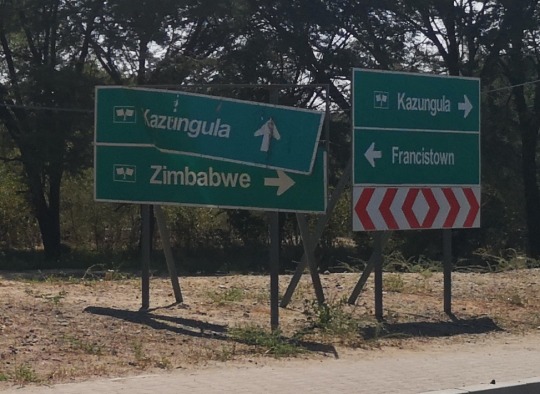
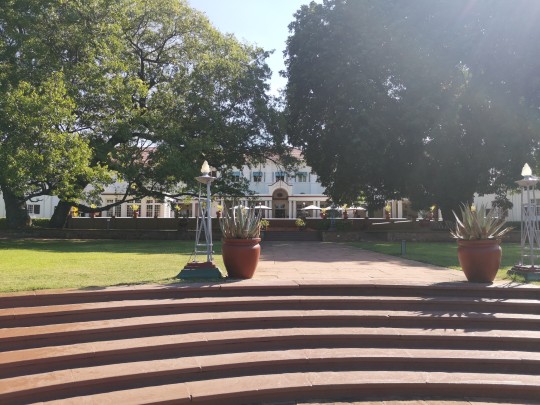
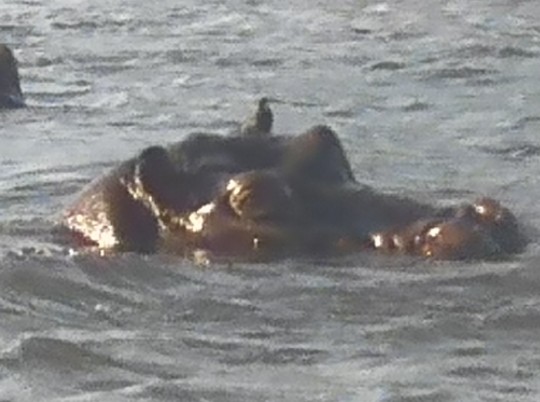
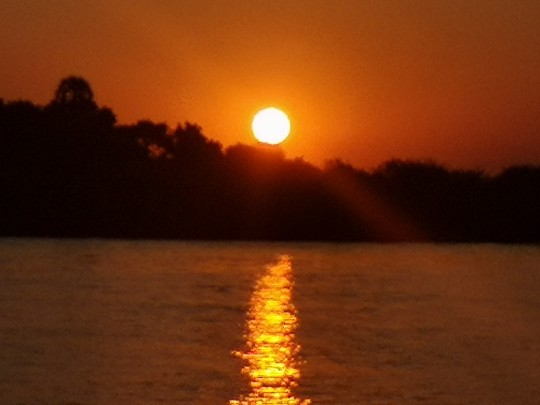
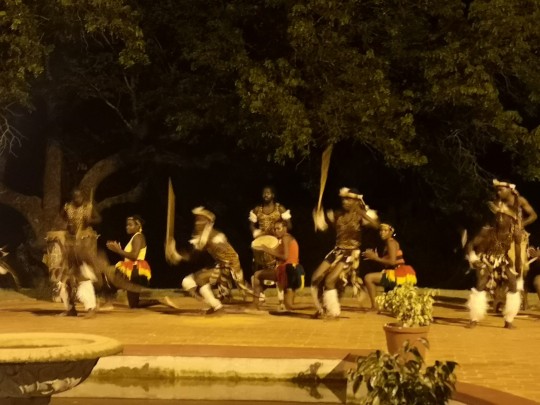

2 notes
·
View notes
Text
What Does "Disproportionate" Look Like?
There was a little chatter this week that the Biden Administration, as part of its initiative to combat antisemitism, might give a positive mention to the "Nexus" document. Little ol' Nexus! Who knew!
This news has generated pushback from the rightward elements of the Jewish community, including -- this is a right-wing campaign in 2023, after all -- comparing Nexus to Chinese authoritarianism and spuriously tying us to pedophilia.* What fun.
I might weigh in on this broader controversy. But this post is more about a sidebar to the debate.
One prominent portion of Nexus that has been flagged in these conversations is how we treat "double standards". Nexus, unlike JDA, does not say that it is okay to hold Israel to a double-standard. However, it says that the mere fact of "disproportionate attention to", or differential treatment of, Israel, is not per se proof of a problematic double-standard. People pay "disproportionate attention" to Israel for all sorts of reasons, and many times its completely benign. There certainly are cases where that attention is problematic; but there are in many cases, where said attention in no way justifies drawing an inference of a problematic double-standard.
AIPAC, ZOA, NGO Monitor, APN, Adalah, the American Task Force on Palestine -- all of these focus on Israel more than other countries, and that's their prerogative. It is neither weird nor sinister for a Jewish or Palestinian organization to devote more attention to human rights issues in Israel compared to China or the Crimea or Zimbabwe, and nobody actually thinks otherwise. One can, I think, fairly contrast the case of AIPAC or Adalah with, say, the UNHRC -- a body which would struggle to articulate a neutral reason for focusing overwhelmingly on Israel but does so anyway. There the antisemitism objection carries significantly more force. Again, the Nexus document provides additional gloss and detail that can help fairly instantiate the IHRA rule, avoiding opportunistic deployments where the mere fact that a Palestinian organization is talking predominantly about Palestinian issues is held out as an antisemitic "double-standard".
In short, Nexus observes that it's not the attention alone that proves a double-standard; something more than that is required. This argument is pretty hard to gainsay, in my view, and it's been amusing to watch some folks on Twitter jackknife wildly between being enraged at how "clearly wrong" Nexus is for saying that disproportionate attention is not per se proof of antisemitism to, when given the example of AIPAC or the Kohelet Forum (which is disproportionately criticizing Israel's judiciary setup far more than it attacks those of other countries), being enraged at how clearly right Nexus is.
But all of this raises the question: what does disproportionate attention even look like?
For example, one of my interlocutors last night gave three examples of human rights groups whose Twitter feeds evinced what he deemed a clearly antisemitically-disproportionate concentration on Israel: Human Rights Watch, Amnesty, and Ken Roth's personal feed.
This is something I hear a lot, and I've often wondered about. It is certainly possible that such groups really do focus on Israel to a wildly excessive degree (I'm familiar enough with the practices of the UNHRC -- which regularly is passing more resolutions about Israel than all other countries in the world combined -- to feel comfortable saying the charge fits for them, for instance). But it's also plausible that certain observers who care primarily about Israel -- pay disproportionate attention to it, we might say -- will only notice a group like HRW talking when it's talking about Israel, in which case, yes, it will seem like it does nothing but talk about Israel. But that's a function of one's own attention span, not HRW's conduct.
So last night, I actually went through these three Twitter feeds -- @HRW, @Amnesty, and @KenRoth -- to see what "disproportionate" looked like. Here's what I did:
For HRW and Ken Roth, I looked at all their tweets this week up until about 3 AM last night. For Amnesty, which tweeted less frequently, I looked at all their tweets for the month of May.
For each tweet, I marked which country was primarily being criticized (virtually all the tweets were critical, there were few if any instances of a country being praised). If multiple countries were being criticized in roughly equal forms ("Keep X and Y off the Security Council"), I coded the tweet as criticizing both. But if the tweet was primarily about one country, with a second country being more background, I only coded the former (e.g., a tweet about US border policies that mentions Mexico still would only be coded as the US).
Total number of tweets may be slightly inaccurate given some tweets covered multiple countries.
I also separately noted tweets that didn't focus on any country, but rather a specific issue area (like the death penalty).
Finally, I counted threads as a single tweet. But multiple tweets in a row about a single country (unthreaded) were each counted separately.
Here's what I found:
Human Rights Watch:
HRW had about 60 tweets/mentions in the relevant time period, which criticized 31 countries.
Of those tweets, 1 was primarily about Israel.
The most commonly targets in this time period were Indonesia, Poland, and Belarus, each of which had five mentions.
Other multiples include Vietnam (3), Afghanistan (3), Myanmar (3), Pakistan (3), the UAE (2), and Egypt, (2).
Ken Roth
Ken had about 80 tweets/mentions in the relevant time period, which criticized 31 countries.
The most common target for Ken were China and Russia, with 13 mentions each.
Israel was the third-most common target, with seven mentions.
Other multiples included India (6), Sudan (4), Belarus (3), Syria (3), Myanmar (3), Saudi Arabia (2), Ethiopia (2), Greece (2), Turkey (2).
Amnesty
Amnesty had about 63 tweets/mentions in the relevant time period, which criticized 16 countries (keep in mind that, because Amnesty tweeted less frequently, its time period was longer -- the entire month of May).
For what it's worth, had I looked at Amnesty's tweets just for this week, it would have had only eight, none of which were about Israel.
Amnesty was far more likely than HRW and Ken to tweet about general issues rather than country-specific incidents and policies. Sixteen of its tweets were about general policies, including six on the death penalty, four on LGBTQ rights, two on press freedom, two on social security, and one each on women's rights and climate change.
Amnesty's most common target was Israel, with 16 mentions. The next-most common target was Iran, with five.
Other multiples included the USA (4), Sudan (4), Pakistan, (4), Uganda (3), Peru (3), Kenya (2), and Russia (2).
So what do we draw from all of this -- assuming for sake of argument that the time period I drew from was representative? Are these groups actually paying disproportionate attention to Israel, or is it an artifact of the relevant observers only caring about them when they talk about Israel?
I would say the results are mixed. For Human Rights Watch, where just 1/60 mentions were about Israel, I think it is pretty hard to maintain that Israel is being subjected to some sort of unfair "double-standard" based on the amount of attention it received. Notice, though, one still could argue that it is receiving "disproportionate" attention -- there are 195 countries in the world, and yet Israel received 1/60th of the attention! Or one could say that giving Israel equal attention to Russia (which also had one mention), or the lack of a mention for China in this time period, is "disproportionate" given Russia and China's graver current offenses (though if that's the argument, how much more of a basis of complaint do the Poles, Indonesians, and Belarussians have!).
Still, to the extent that this sort of treatment is what's being deemed "disproportionate", I think Nexus is clearly correct in rejecting the notion that there's anything per se antisemitic about it. And to the extent that some persons perceive HRW as focusing "obsessively" about Israel to the exclusion of other countries, that seems (again, assuming this period was representative) almost certainly attributable to those observers only paying attention to HRW when it talks about Israel.
For Amnesty, by contrast, 16/63 mentions were about Israel -- 3x more than the next closest rival of Iran. Here, I think the claim of genuinely problematic "disproportionate" attention is at least more colorable. While we can argue whether this is antisemitic or not, with Amnesty it does seem like the perception that it focuses disproportionately on Israel in a potentially problematic way does seem like it is warranted -- it isn't just an artifact of the listener's own slanted priorities. I will note, though, that in terms of "disproportionate attention", even Amnesty lags behind the UNHRC, which again has historically targeted in Israel in more than half of its entire body of work! Amnesty's 16/63 -- roughly 25% -- looks positively charitable in comparison!
Finally, Ken Roth is somewhere in the middle. Israel is the focus of his attention more than many other countries, but not all of them -- it stands behind both Russia and China. Is this a case of a problematic "double-standard"? It doesn't seem so -- Israel doesn't "stand out" alone on a precipice like it does for Amnesty, it is treated similar to other countries that Ken also thinks are human rights violators. One could again cherry-pick and say "well, what of Cuba -- Ken didn't talk about them at all in this period -- and they're a human rights violator too!" But this is not actually a workable standard -- political discourse simply does not work like this, where every commentator is talking about every potential token of injustice in complete equal proportion.
Relatedly, I've definitely heard the claim that given how much worse Russia and/or China is than Israel, it is "disproportionate" to focus on Israel even equally (or here, considerably less than equally) to those countries. But that sort of argument seems almost impossible to operationalize in practice, in part because it's subjective, in part because it's clearly not the case that there either is or should be a 1:1 correlation between some sort of universalist rubric of gravity-of-offense and attention paid. That's not how political discourse works, and it's not how it can possibly work. Indeed, I daresay that few think of applying that sort of standard in any case but Israel's (and even here -- does anyone say that any attention paid to Palestinian terror is prima facie "disproportionate" if it is not dwarfed by attention paid to far greater atrocities like the Myanmar genocide? Again, this just isn't workable). This, again, ratifies Nexus' instinct to not let "disproportionate" alone suffice; as the sort of conduct that is being called "disproportionate" is not actually behavior that can reasonably be indicted as problematic.
In all these cases, of course, it could be that the relevant coverage is antisemitic for other reasons ("disproportionate" is not the only basis for calling something antisemitic, after all). But to the extent one wants to argue that the allegedly "disproportionate" coverage of these groups validly generates an inference of antisemitism, that's hard to warrant at least for HRW and Roth, though it may be for Amnesty. Perhaps unsurprisingly, there is both some truth to the notion that some groups focus on Israel in an obsessive or wildly off-kilter fashion, but it is also true that this belief has caused some observers to assume that this sin is more widespread and ubiquitous than it actually is, and make accusations of problematic disproportionality in cases where it can't really hold together.
* Lest you think the latter is some egg-profile Twitter account with 54 followers and a shiny new blue checkmark, it actually came from Shmuley Boteach. So not too far from an egg-profile Twitter account with 54 followers and a shiny new blue checkmark.
via The Debate Link https://ift.tt/ysx7cng
5 notes
·
View notes
Text
New Taskmaster episode did not disappoint. I watched it with my girlfriend, and she says “someone should bring in a dildo for that” on about 10% of all prize tasks from any season, so she was, of course, very pleased with Sarah Millican, as was I. Here are some thoughts I have that are not about dildos:
- You know how sometimes someone who’s quite famous outside Taskmaster will go on the show, and we expect them to be one thing because we know them pretty well, and then they end up completely different (classic example being Victoria Coren Mitchell, obviously)? What I’m getting based on one episode is that Dara O’Briain is the anti-that. Dara is O’Briain is exactly what I expected. Competitive, argumentative, a little befuddled at times but insists on styling it out and trying to cover up any stumbles, throws himself right into everything. That is Dara. I also enjoyed the little reference to Lee Mack, when Greg says this isn’t the first time someone has come on the show because their kids like it and been competitive because they want to impress their kids, and then have their kids lose respect for them every time they fuck things up.
- I expected to like Munya, I was looking forward to seeing Munya, I mainly know him from Frankie Boyle’s New World Order but I’ve also seen some of his videos on YouTube and the quick turnaround time on them makes me think he was born to play Taskmaster. And still, in episode one he blew past my high expectations. The Zimbabwe stories, where I have a feeling the sense that we can’t tell whether or not it’s true will be a running theme (that sort of thing is familiar to me, as I coach a bunch of athletes who come from the Middle East, and sometimes they’ll tell me stories about riding camels back when they lived in Egypt or whatever, and I cannot tell if they’re joking no matter how far they take it). The poise and quick thinking in the painting task. The whole attitude in the studio was so enjoyable to watch. The confidence in the live task. The asking John Kearns to hold his hand for reasons I could absolutely not work out. It is so hard to pick any one favourite of these people but he is up there.
- When it comes to Fern Brady, obviously I’m biased by the fact that I am a human with a sexual orientation that includes women, and that is the only criterion required for me to immediately take notice whenever Fern Brady is on the screen. But I’m pretty sure that even if I took out all my bias that comes from finding her very very attractive, I would still find her absolutely fucking amazing. The way she can somehow do “self-assured” and “about to fall apart” at exactly the same time is captivating, because I don’t know how she manages it. The way she can combine “fuck it, I don’t care” with trying really hard. The things she finds funny. The directions her mind goes, and it often gets there quicker than other people’s. I enjoy watching Fern Brady do anything, and I am so pleased that I get to watch her do Taskmaster.
- I mean, what is there to say about Sarah Millican? Ed Gamble said on the podcast that on reputation alone she’s almost more formidable than Dara, and I see his point. I would try to fuck with Dara O’Briain before I’d try to fuck with Sarah Millican. The voice of experience, she’s sure about everything she understands and doesn’t mind about everything she doesn’t. She knows exactly what is funny when it comes from her, and plays to that every time she opens her mouth. Her sort of “aunt-recently adopted nephew” dynamic with Munya is awesome. She’s just having a good time, an absolute delight. Also, she brought a dildo to the first episode.
- John Kearns was the one I didn’t know before this; I vaguely know what Guessable is but I’ve never seen it, and I remember him from the character act he did on Catsdown that people on the internet insist is very funny in his own comedy routines, but all I know is it doesn’t work as a dictionary corner bit. I’m still not quite sure what to make of him, mostly, but I’m pretty sure whatever his schtick is I find it funny. The sort of understated, pause for a moment before responding to or laughing at things, stare blankly when presented with something strange, explain everything he does as though it makes sense... by the end of the episode I was starting to catch on to how it works and it was making me laugh. I’m pleased that I get more episodes to get to know this guy.
16 notes
·
View notes
Text
Top 10 Courses for Zimbabweans: How to Boost Your Salary and Secure Future Jobs
Navigating the post-graduation landscape requires making pivotal decisions about one’s professional trajectory. It is not often one deliberates over a lifelong Top 10 Most Demanding Courses for Some people suggest determining which competences are most in-demand and then choosing educational programs that improve those abilities. This session, we’ll go over the most important skills to learn and the best courses that cover them.

Top 10 Prospective Courses for the Future Job Market :
1. Business Communication Course
The Master of Business Administration (MBA) is a highly respected degree that encompasses essential skills that employers seek. Business communication is also quite important. Procuring a Executive Diploma in Business Communication equips you with essential capabilities to articulate effectively within an organization, paving the way for positions such as business analyst or consultant.
2. Diploma in Environment Health and Safety Management
Experts in Environment, Health, and Safety (EHS) are essential for handling industrial waste and guaranteeing worker safety.A Diploma in Environment Health and Safety Management is an excellent starting point, grooming you for roles in overseeing environmental and occupational safety protocols.
3. Digital Marketing Course Online
In the contemporary digital epoch, businesses necessitate an online presence. Executive Diploma in Business Communication skills empowers you to construct and sustain this presence, rendering it a quintessential skill for the future.
5. Project Management Course Online
Project management is leading groups of people to complete tasks from start to finish.A Executive diploma in project strategic management imparts collaboration, planning, and budgeting skills, which are highly coveted.
6. Data Science and Analytics Course
Businesses all throughout the world acquire data, hence data scientists are required to interpret this data. Data extraction and analysis are taught in a data science and analytics course, which makes it a vital future talent.
Why Zimbabweans Should Pursue These Courses Benefits for Zimbabweans:
Economic Growth Contribution: Zimbabweans who pursue these courses can contribute to the country’s economic growth by enhancing productivity and innovation.
Skill Diversity: The combination of technical and soft skills prepares Zimbabweans to tackle complex challenges, making them adaptable in a rapidly evolving job market.
Job Market Readiness: These courses align with global trends, increasing employability and competitiveness on both local and international platforms
Enhanced Career Prospects: These courses provide Zimbabweans with the skills necessary to excel in various industries, improving their job prospects.
Increased Earning Potential: With specialized knowledge, Zimbabweans can secure higher-paying jobs and advance in their careers.
Contribution to National Development: The skills gained can drive innovation and development in Zimbabwe, contributing to the nation’s growth and prosperity.
By embarking on these educational courses from UniAthena Ghanaians can play a pivotal role in the country’s development, ensuring they are prepared for the future job market and can excel in their careers.
#aitraining#machinelearning#techskills#professionaldevelopment#economicgrowth#careergrowth#artificialintelligence#careeradvancement#techeducation#skilldevelopment
0 notes
Text
U.S. DEPARTMENT OF JUSTICE AUSA GLENN LEON'S HEALTHCARE FRAUD TASK FORCE DYSTOPIAN WAR ON HEALTHCARE HEROES THE PATIENTS THEY SERVE AND CARE FOR
At the center of this unfolding saga is Dr. Joseph Parker. His story is one of courage and defiance in the face of a system determined to retire him, much like the replicants in the sci-fi film classic Blade Runner.
In a world not so far removed from the dystopian futures depicted in science fiction, a group of doctors and patients find themselves on the front lines of a battle against governmental forces seeking to silence them.
NORMAN J CLEMENT RPH., DDS, NORMAN L. CLEMENT PHARM-TECH, MALACHI F. MACKANDAL PHARMD, BELINDA BROWN-PARKER, IN THE SPIRIT OF JOSEPH SOLVO ESQ., INC.T. SPIRIT OF REV. IN THE SPIRIT OF WALTER R. CLEMENT BS., MS, MBA. HARVEY JENKINS MD, PH.D., IN THE SPIRIT OF C.T. VIVIAN, JELANI ZIMBABWE CLEMENT, BS., MBA., IN THE SPIRIT OF THE HON. PATRICE LUMUMBA, IN THE SPIRIT OF ERLIN CLEMENT SR., EVELYN J.…

View On WordPress
0 notes
Text
The Importance of Harare Appliances Repair Service: Keeping Your Home Running Smoothly
Home appliances have become indispensable in our daily lives. From refrigerators and washing machines to ovens and dishwashers, these appliances make household tasks more manageable and efficient. However, like all machines, appliances are prone to wear and tear, and when they break down, it can disrupt our daily routines. That's where Harare appliances repair service comes into play. Offering expertise, convenience, and cost-effectiveness, these repair services are essential for maintaining the functionality of our home appliances.
The Need for Professional Repair Services
Harare, the bustling capital of Zimbabwe, is home to a wide array of households relying heavily on modern appliances. When an appliance malfunctions, the immediate thought might be to replace it. However, replacement is often an expensive option. Instead, opting for a reliable Harare appliances repair service can save you both time and money. Professional repair technicians are trained to diagnose and fix a wide range of appliance issues, ensuring that your machines are up and running in no time.

Benefits of Harare Appliances Repair Service
Cost-Effective Solutions: Repairing an appliance is usually more affordable than buying a new one. A skilled Harare appliances repair service technician can often identify the problem and provide a quick fix, extending the life of your appliance. This not only saves you money but also reduces waste, making it a more environmentally friendly option.
Convenience and Efficiency: When an appliance breaks down, it can cause significant inconvenience. For instance, a malfunctioning refrigerator can lead to spoiled food, while a broken washing machine can disrupt your laundry routine. With a dependable Harare appliances repair service, you can schedule repairs at your convenience, minimizing disruption to your daily life. The technicians come equipped with the necessary tools and parts, ensuring a quick and efficient repair process.
Expert Knowledge and Experience: Harare's repair services boast technicians who are well-versed in a variety of appliance brands and models. Their extensive knowledge allows them to accurately diagnose issues and apply the most effective solutions. Whether it's a complex electrical problem or a simple mechanical fault, a Harare appliances repair service technician has the expertise to handle it.
Safety Considerations: Attempting to repair appliances without the proper knowledge and tools can be dangerous. Appliances operate using electricity, gas, and other potentially hazardous materials. A professional repair technician understands the safety protocols necessary to handle these risks, ensuring that the repair process is safe for both you and your home.

Choosing the Right Repair Service
When selecting a Harare appliances repair service, it is crucial to consider factors such as reputation, experience, and customer reviews. A reputable service provider will offer transparent pricing, quality workmanship, and excellent customer support. Additionally, look for technicians who are licensed and insured, as this provides an extra layer of protection and peace of mind.
A reliable Harare appliances repair service is vital for keeping your household appliances in top working condition. By opting for professional repairs, you not only save money but also ensure the longevity and efficiency of your appliances. The convenience, expertise, and safety offered by these services make them an invaluable resource for Harare residents. So, the next time your appliance acts up, remember that a skilled repair technician is just a call away, ready to bring your home back to its smooth, functioning best.
0 notes
Text
Benefits of Emerald Beads

Emerald Stone Beads
Emerald beads are small, polished beads made from the gemstone emerald. Emerald is a variety of the mineral beryl, and it is valued for its deep green color. Emeralds are typically found in Colombia, Zambia, Brazil, and Zimbabwe, among other countries.
Emerald beads are popular in jewelry making, especially in necklaces, bracelets, and earrings. They can be used alone or combined with other gemstones to create a unique and beautiful piece of jewelry. Because emerald is a relatively hard gemstone, it is durable enough to be worn daily with proper care.
In addition to their use in jewelry making, emerald beads are also used in healing and spiritual practices. Some people believe that emerald has healing properties that can help to calm the mind, promote emotional balance, and stimulate the immune system.
Overall, emerald beads are a beautiful and versatile gemstone that can be enjoyed both for their aesthetic appeal and for their potential healing properties.

Benefits of Emerald Beads
Emerald beads are a popular choice for jewelry due to their beauty and durability, but they also offer a range of benefits beyond aesthetics. Some potential benefits of wearing emerald beads include:
Emotional Healing: Emeralds are believed to have a calming effect on the emotions and can help to soothe feelings of anxiety and stress. They are also said to promote a sense of inner peace and balance.
Physical Healing: Emeralds are thought to have physical healing properties, particularly when it comes to the heart and respiratory system. They may also help to alleviate digestive issues and improve overall immune function.
Mental Clarity: Wearing emerald beads is said to improve mental clarity and focus, making it easier to concentrate and stay on task. They may also enhance memory and decision-making abilities.
Spiritual Growth: Emeralds are associated with the heart chakra, which is the center of spiritual growth and self-awareness. Wearing emerald beads can help to open and activate this chakra, promoting greater spiritual connection and awareness.
Beauty and Fashion: Of course, one of the most obvious benefits of wearing emerald beads is their beauty and aesthetic appeal. They are a timeless and elegant choice for jewelry and can add a touch of sophistication to any outfit.
Overall, emerald beads offer a range of benefits for both physical and emotional well-being, as well as spiritual growth and aesthetic appeal.
Are emerald beads real?
What are the benefits of the emerald stone?
What does emerald stone symbolize?
क्या पन्ना के मोती असली होते हैं?
Emerald Beads at Best Price in India
Buy Natural Emerald Bead Online In India
Original Emerald Beads price
Emerald stone beads benefits
Natural emerald stone beads
Emerald Beads price in India
Real emerald stone beads
Real Emerald Beads Mala
Unit of Salasar Ji Gems LLP 1185-87, Shop No. 9, Gems Plaza, Chhatta Madan Gopal, Maliwara, Chandni Chowk, Delhi, India, 110006
9971391757
0 notes
Text
Out of Africa (Jenseits von Afrika)

David Livingstone
The name “David Livingstone” is closely linked to the Victoria Falls because he discovered this natural wonder of the earth. But not only that - he is one of the white people who is still fondly remembered in Africa. Zambia's first president Kenneth Kaunda once described Livingstone as "Africa's first freedom fighter" in 1964 (when Zambia gained independence). Livingstone witnessed the massacre of 400 blacks by Arab slave traders. A diary entry by Livingstone about this event, later published by the journalist Morton Stanley, contributed significantly to the closure of the most important slave trading center in East Africa on the island of Zanzibar. Great Britain forced the ruling Sultan to do so by force of arms. Livingstone's pioneering work, his love for this continent and his fight against the slave trade are the reasons why he is revered in Africa - even the bus driver who drove us to a boat trip on the Zambezi in Victoria Falls expressed this reverence in his words.
His goals - to prove that the Zambezi could be used as a transport route and to find the source of the Nile - Livingstone could never achieve. However, his achievement is that he brought Africa closer to the Europeans. His descriptions, his observations and his notes about animals, plants and people expanded knowledge about the previously largely unknown continent. We traveled to Africa because of the animals and the unique landscapes. We got to know many ordinary, but satisfied and friendly people who presented their country and their way of life to us with pride and often with humor (“you get an African massage when driving over the bumpy African roads”). But we also saw the negative side of the coin: poverty and people who will do almost anything to survive.
The tour guide and bus driver on our trip was such an ordinary and friendly man - and very proud of his Herero origins, which he often emphasized. From 1884 to 1915, Namibia was part of what was then the German Empire as German South West Africa. The Herero and Nama rose up against their colonial masters in 1904. This uprising was brutally suppressed by German troops under the command of Lothar von Trotha. Most of the Herero fled to the almost waterless Omaheke Desert. Trotha had it blocked off and chased away the refugees from the few waterholes that existed there, so that thousands of Herero, along with their families and herds of cattle, died of thirst. Trotha's actions are considered by scholars to be the first genocide of the 20th century. The Herero still remember this today with a day of remembrance. A strange scene: The Herero, whose ancestors were so harassed by Germans, now had the task of driving and accompanying a German tour group safely through Zimbabwe, Botswana and Namibia.
Germany has been working on a reconciliation agreement in this matter with Namibia for some time - which was pushed forward by Namibian President Hage Geingob, who died earlier this year. However, an official agreement with Namibia on “reparations payments” has not yet been reached. Africa is sometimes “complicated” - depending on which ethnic group is “in charge” in the country and sometimes does not necessarily focus on the interests of other ethnic groups.
The UN Genocide Convention of 1948 emerged as a direct reaction to the mass atrocities committed by the German Reich in World War II. The Soviet Union ensured that the destruction of entire layers or classes – later called sociocide – was not included in the definition. What is hardly known, however, is that Great Britain and France, but also the USA, Canada and Australia, as old colonial powers, ensured that the systematic cultural destruction of a group and the forced assimilation of indigenous peoples and national minorities were not included in the definition as well. It's easier to point the finger at others than to admit or deal with your own crimes. The Africans have regained sovereignty over their land - the indigenous peoples in America and Australia were less fortunate.
There is still a monument in Swakopmund today that commemorates the German soldiers who died in the 1904 conflict described above. Namibia has been independent from South Africa since 1990 - and I couldn't help but wonder why the monument hasn't been torn down long ago? Maybe because every death in a conflict is one too many? Swakopmund is generally a very “German” city - with many buildings, its flair and street names from the former colonial era. You go to the chic, expensive restaurants and cafes in Swakopmund and you almost only meet “white” customers there. “Blacks” often cannot afford this - which is why “blacks” almost exclusively serve “whites”. Inwardly I thought to myself: “Somehow not much has changed in this regard in the last hundred years!” It was a depressing situation for us. African countries are free today - but are they really independent? A statement from our tour guide: “We are still so dependent on South Africa. When truck drivers go on strike in South Africa, the shelves in Namibia's supermarkets are empty. When Namibia was still part of South Africa, life was even better.” The African continent has raw materials and quite clever people - but somehow they often can't get the horsepower on the road there. There is still a lot to do - and I think the ex-colonial powers have a special responsibility to help this continent which they have plundered for decades.
There are these “perfect days” - and our second day in Chobe National Park in Botswana was one of them. On the morning safari in an open off-road vehicle, we not only saw one of those red African sunrises - we also saw two male lions walking completely unperturbed, almost tactile, in front of us. In the afternoon we took a boat along the Chobe River and were able to observe many animals up close in their natural behavior: grazing water buffaloes, hippos and crocodiles dozing in the afternoon sun. There were also two elephant bulls who were playfully competing against each other. And an elephant matriarch who led her family swimming across the Chobe River. You don't see anything like that in a zoo. The icing on the cake was that our boat was steered to the perfect spot to photograph the sunset. All highly emotional moments.
The majestic Namib Desert stretches along the 1,500 km long Namibian coast (also called the “skeleton coast” because of the many whale skeletons there). The coast is therefore almost deserted (there are only 4 small coastal towns there - including Swakopmund)… and is lined with shipwrecks because there is often dense fog, treacherous currents and shifting sandbanks. The coast includes three national parks, each extending approximately 50 km inland: Namib Naukluft National Park, Dorob National Park (with Cape Cross) and Skeleton Coast Park. These are intended to preserve the unique nature there - probably out of wise foresight, because Namibia is one of the leading mining nations for diamonds, uranium, zinc and fluorspar. The Namib Desert was my first desert with a wide dune landscape. The wind creates an incredibly majestic and beautiful scenery there. Every picture taken is like a painting in sand colors.
Apart from Africa, there is probably no other continent where the wilderness is so well preserved and can be experienced up close. It's definitely not the last time we've been to Africa. Maybe that's the magic of this continent - once you've visited it, you come back with longing.


Der Name „David Livingstone“ ist eng mit den Victoria Falls verbunden, denn er entdeckte dieses Naturwunder der Erde. Aber nicht nur das - er ist einer der Weissen, an den man sich in Afrika immer noch gern erinnert. Sambias erster Präsident Kenneth Kaunda bezeichnete Livingstone 1964 einmal als „Africa's first freedom fighter“ (als Sambia seine Unabhängigkeit erlangte). Livingstone wurde Zeuge an der Massakrierung von 400 Schwarzen durch arabische Sklavenhändler. Ein vom Journalisten Morton Stanley später veröffentlichter Tagebucheintrag Livingstones über dieses Ereignis hat wesentlich dazu beigetragen, dass der wichtigste Sklavenhandelsplatz Ostafrikas auf der Insel Sansibar geschlossen wurde. Grossbritannien zwang den herrschenden Sultan mit Waffengewalt dazu. Livingstones Pionierarbeit, seine Liebe für diesen Kontinent und sein Kampf gegen den Sklavenhandel sind der Grund dafür, dass er in Afrika verehrt wird - selbst der Busfahrer, der uns in Victoria Falls zu einem Bootstrip auf dem Sambesi fuhr, lies diese Verehrung in seinen Worten spüren.
Seine Ziele - zu beweisen, dass der Sambesi als Verkehrsweg nutzbar sei, sowie die Nilquelle zu finden - konnte Livingstone nie erreichen. Sein Verdienst aber ist es, dass er den Europäern Afrika nahe brachte. Seine Beschreibungen, seine Beobachtungen, seine Notizen über Tiere, Pflanzen und Menschen erweiterten das Wissen über den bis dahin weitgehend unbekannten Kontinent. Wegen der Tiere und der einzigartigen Landschaften reisten wir nach Afrika. Wir lernten dabei viele einfache, jedoch zufriedene und freundliche Menschen kennen, die uns mit Stolz und häufig mit Witz („eine afrikanische Massage bekommt man, wenn über die holprigen afrikanischen Strassen fährt“) ihr Land und ihre Lebensweise präsentierten. Die negative Seite der Medaille sahen wir aber auch: Armut und Menschen, die fast alles tun, um zu überleben.
Der Reiseleiter und zugleich Busfahrer unserer Reise war ein solch einfacher und freundlicher Mann - und sehr stolz auf seine Herkunft als Herero, die er oft betonte. Namibia gehörte von 1884 bis 1915 als Deutsch-Südwestafrika zum damaligen Deutschen Reich. Die Herero und Nama erhoben sich 1904 gegen ihre Kolonialherren. Dieser Aufstand wurde brutal durch deutsche Truppen unter dem Kommando von Lothar von Trotha niedergeschlagen. Der größte Teil der Herero floh in die fast wasserlose Omaheke-Wüste. Trotha ließ diese abriegeln und Flüchtlinge von den wenigen dort existenten Wasserstellen verjagen, so dass Tausende Herero mitsamt ihren Familien und Rinderherden verdursteten. Trothas Vorgehen gilt in der Wissenschaft als erster Völkermord des 20. Jahrhunderts. Die Herero erinnern noch heute mit einem Gedenktag daran. Eine eigentümlich Szene also: Der Herero, dessen Vorfahren durch Deutsche so drangsaliert wurden, hatte nun die Aufgabe, eine deutsche Reisegruppe sicher durch Simbabwe, Botswana und Namibia zu fahren und zu geleiten.
Deutschland arbeitet in dieser Angelegenheit seit geraumer Zeit an einem Aussöhnungsabkommen mit Namibia - das durch den Anfang dieses Jahres verstorbenen namibischen Präsidenten Hage Geingob vorangetrieben wurde. Eine offizielle Übereinkunft mit Namibia über „Reparationszahlungen“ konnte jedoch bisher noch nicht erreicht werden. Afrika ist manchmal „kompliziert“ - je nachdem, welche Ethnie im Land „das Sagen“ hat und dabei die Interessen anderer Ethnien manchmal nicht unbedingt im Fokus hat.
Die Genozidkonvention der Uno von 1948 entstand als unmittelbare Reaktion auf die Massenverbrechen des Deutschen Reiches im Zweiten Weltkrieg. Die Sowjetunion erreichte, dass die Vernichtung ganzer Schichten oder Klassen – später Soziozid genannt – nicht in die Definition einfloss. Kaum bekannt ist hingegen, dass Grossbritannien und Frankreich, aber auch die USA, Kanada und Australien als alte Kolonialmächte dafür sorgten, dass die systematische kulturelle Zerstörung einer Gruppe und die Zwangsassimilation von indigenen Völkern und nationalen Minderheiten auch nicht Eingang in die Definition fanden. Es ist eben leichter auf andere zu zeigen, als sich selbst seine Verbrechen einzugestehen oder aufzuarbeiten. Die Afrikaner haben die Souveränität über ihr Land wieder zurückerlangt - die indigenen Völker in Amerika und Australien hatten da weniger Glück.
In Swakopmund gibt es heute noch ein Denkmal, das an die deutschen Gefallenen des oben beschriebenen Konflikts von 1904 erinnert. Namibia ist seit 1990 von Südafrika unabhängig - und ich fragte mich unwillkürlich, warum man das Denkmal nicht längst abgerissen hat? Vielleicht, weil jeder Tote in einem Konflikt einer zu viel ist? Swakopmund ist generell eine sehr „deutsche“ Stadt - mit vielen Gebäuden, seinem Flair und Straßennamen aus der ehemaligen Kolonialzeit. Man geht in die schicken, teuren Restaurants und Cafes in Swakopmund und trifft dort fast nur „weisse“ Kunden. „Schwarze“ können sich das nämlich oft nicht leisten - deshalb bedienen „Schwarze“ fast ausschliesslich „Weisse“. Innerlich dachte ich mir: „Irgendwie hat sich in den letzten hundert Jahren diesbezüglich dann nicht viel geändert!“ Es war eine bedrückende Situation für uns. Die afrikanischen Länder sind heute frei - aber sind sie wirklich unabhängig? Eine Aussage unseres Reiseleiters: „Wir sind immer noch so abhängig von Südafrika. Wenn in Südafrika die LKW-Fahrer streiken, sind in Namibias Supermärkten die Regale leer. Das Leben früher war sogar besser, als Namibia noch Teil von Südafrika war.“ Der afrikanische Kontinent hat Rohstoffe und durchaus clevere Menschen - aber irgendwie bekommt man oft dort die PS nicht auf die Strasse. Es ist noch viel zu tun - und ich denke, die Ex-Kolonialmächte haben hier eine besondere Verantwortung, dem Kontinent zu helfen, den sie jahrzehntelang ausgeplündert haben.
Es gibt diese „perfekten Tage“ - und unser zweiter Tag im Chobe Nationalpark in Botswana war ein solcher. Auf der morgendlichen Safari im offenen Geländewagen sahen wir nicht nur einen dieser roten afrikanischen Sonnenaufgänge - wir sahen auch zwei männliche Löwen, die vollkommen unbeirrt, fast greifbar vor uns entlang spazierten. Am Nachmittag fuhren wir im Boot den Chobe River entlang und konnten viele Tiere aus nächster Nähe in ihrem natürlichen Verhalten beobachten: grasende Wasserbüffel, in der Nachmittagssonne dösende Flusspferde und Krokodile. Auch zwei Elefantenbullen, die sich spielerisch miteinander im Kräftemessen übten. Und eine Elefanten-Matriarchin, die ihre Familie schwimmend durch den Chobe River führte. So etwas sieht man in keinem Zoo. Das Sahnehäubchen war dann noch, dass unser Boot an den perfekten Spot gesteuert wurde, um den Sonnenuntergang zu fotografieren. Alles höchst emotionale Momente.
Der 1500 km langen, namibischen Küste entlang (aufgrund der vielen Wal-Skelette dort auch „Skelettküste“ genannt ) erstreckt sich die majestätische Namib-Wüste. Die Küste ist deshalb fast menschenleer (es gibt dort nur 4 kleine Küstenstädte - u.A. Swakopmund)….und ist gesäumt von Schiffwracks, weil es dort häufig dichten Nebel, tückische Strömungen und wandernde Sandbänke gibt. Die Küste umfasst drei Nationalparks, die sich jeweils ca. 50 km ins Landesinnere erstrecken: Namib Naukluft National Park, Dorob National Park (mit Cape Cross) und Skeleton Coast Park. Diese sollen die einzigartige Natur dort erhalten - wohl aus weiser Voraussicht, denn Namibia zählt zu den führenden Bergbaunationen für Diamanten, Uran, Zink und Flussspat. Die Namib-Wüste war meine erste Wüste mit einer weiten Dünenlandschaft. Der Wind formt dort eine unglaublich majestätische und schöne Szenerie. Jedes geschossene Bild ist wie ein Gemälde in Sandfarben.
Es gibt neben Afrika wohl keinen weiteren Kontinent, wo die Wildnis noch so gut erhalten und hautnah erlebbar ist. Wir sind bestimmt nicht das letzte Mal in Afrika gewesen. Vielleicht ist das die Magie dieses Kontinents - wenn man ihn einmal besucht hat, kommt man mit Sehnsucht zurück.

-Simplicius Simplicissimus
#traveling#reisen#africa#afrika#david livingstone#herero#genocide#genozid#perfect day#perfekter tag#namib desert#wildlife#history#namibwüste#wilde tiere#geschichte#simplicius simplicissimus
0 notes
Text
Discovering Freshness: Navigating Harare's Online Grocery Store, ShopExpress
In the bustling city of Harare, Zimbabwe, accessing quality produce can sometimes feel like a daunting task. However, with the advent of online shopping, a new avenue has emerged for residents to procure fresh and top-notch groceries conveniently. Among the array of online grocery stores, ShopExpress stands out as a beacon of reliability and freshness.
Unveiling the Convenience of Online…

View On WordPress
0 notes
Text
Community Support and Care | bocs.net.au
Community care is a form of empathy that pushes people to think about their wellbeing as an extension of the needs of those around them. It is a practice that can be implemented formally or informally.
Community support services can have many benefits for individuals with disabilities. For instance, one study found that community support increases the confidence of care-recipients with disabilities in their ability to continue living in the community.
Self-Care
Self-care is the ability of individuals, families and communities to promote health, prevent disease, maintain health, and cope with illness and disability with or without the support of a health worker. As the world struggles to meet its demand for healthcare services, self-care is gaining attention as an important strategy for managing chronic diseases.
A self-care routine can help you improve your mental and physical well-being, reduce stress and anxiety, boost happiness levels, and more. It can also benefit your relationships, increase productivity at work, and boost the immune system. It’s important to remember that self-care isn’t something that should be viewed as selfish. When you take care of yourself, you are better able to provide care for others.
It’s important to note that the definition of self-care varies from person to person. For example, a young person who is busy with school and a social life may need to focus on physical self-care, while someone who is retired might have more of an emphasis on psychological self-care.
Isolation
Although some people may enjoy solitude, isolation is an unwelcome state that often carries health risks. Unlike loneliness, which can occur with any amount of social contact, social isolation results from a lack of connections. Individuals who suffer from isolation may benefit from talk therapy, such as cognitive behavioral therapy (CBT). CBT sessions help individuals identify misperceptions and reshape negative thinking.
Communities across the globe are taking innovative steps to address the rise of isolation. They use community care strategies to connect people not only to each other but also to healthcare professionals and resources. For example, Zimbabwe’s Friendship Bench program, now adapted in eight countries from Malawi to Canada, provides a gateway to mental health support by putting trained community members on benches at clinics and communities to offer assistance with tasks of daily living. This helps individuals stay connected to the community and improves their quality of life. It can also reduce the strain on healthcare systems, a key element of the COVID-19 pandemic's physical distancing measures.
Social Media
Social media is a powerful tool for community support and care. Its accessibility allows it to reach a wide audience, especially when it comes to crisis management during times of emergency or natural disaster. It can also be used to provide education on a variety of topics.
In addition to providing educational information, a social media team can be used to promote events and programs in the community. For example, COMPASS uses Twitter to post promotions for regular scholarly events (eg, monthly journal club discussions focusing on articles addressing health equity and social determinants of health) and picture-based promotions of community partnered community health and wellness events.
Moreover, it is important for community-oriented organizations to maintain an active social media presence so that they can be a source of information during emergency situations. They can monitor all relevant queries and comments, hashtags and posts from fans and followers on their owned profiles, and respond to them as quickly as possible. Unanswered comments and questions can damage brand reputation, and the longer a problem is left unsolved, the harder it will be to recover.
#community support and care#community support agency#community support services#community support worker
0 notes
Text
Holidays 2.21
Holidays
Alka Seltzer Day
Armed Forces Day (South Africa)
Ben Appreciation Day
Break Up Day (India)
Card Reading Day
Communist Manifesto Day
Father W.H. Lini Day (Vanuatu)
Find Out My Breast Density Day
Freedom of Worship Day (France)
International Mother Language Day (UN)
International Tourist Guide Day
Introduce a Girl to Engineering Day
John Lewis Day
King Harald V Day (Norway)
Kurt Cobain Day (Aberdeen, Washington)
Labor Day (Oregon; Original Date, 1st State Observance)
Language Movement Day (a.k.a. Shahid Dibosh; Bangladesh)
Locomotive Day
Matthiola Day (French Republic)
Mental Health Nurses Day (UK)
Musikahan Festival begins (Philippines) [thru 2.27]
Nascar Day
National Pillow on Head Day
National Waste Awareness Day (Indonesia)
New Yorker Magazine Day
Nina Simone Day (Tyron, North Carolina)
Red Books Day
Remember the Funniest Thing Your Child Ever Did Day
Robert Gabriel Mugabe National Youth Day (Zimbabwe)
Sandino Day (Nicaragua)
Sewing Machine Day
Single-Tasking Day
Telephone Book Day
Washington Monument Day
Food & Drink Celebrations
Drink It Now Day
National Biscuits & Gravy Day
National Grain-Free Day
National Malört Day
National Sticky Bun Day
World Kombucha Day
3rd Wednesday in February
National RA Appreciation Day [3rd Wednesday]
Weekly Holidays beginning February 21
Potahto Week (Winnipeg, Manitoba, Canada) [thru 3.1]
Independence & Related Days
Aulpannian Shatidom (Declared; 2021) [unrecognized]
British Protectorate in Egypt ended (1922)
South Formosa (Declared; 2021) [unrecognized]
Festivals Beginning February 21, 2024
National Watermelon Association Convention (Scottsdale, Arizona) [thru 2.25]
Noise Pop Festival (San Francisco, California) [thru 2.27]
NordicFuzzCon (Malmö, Sweden) [thru 2.25]
30A Wine Festival (Ales Beach, Florida) [thru 2.25]
Feast Days
Anais Nin (Writerism)
Blue Dragon Festival (China) [2nd Day of 2nd Lunar Month]
Boris Karloff Day (Church of the SubGenius; Saint)
Daniel, priest, and Verde, virgin (Christian; Martyrs)
David Foster Wallace (Writerism)
Day Sacred to the Goddess Muta (a.k.a. Laranda; Ancient Rome)
Double Second Day (China) [2nd Day of 2nd Lunar Month]
Feast of Peace and Love (Ancient Rome)
Felix of Hadrumetum (Christian; Saint)
Feralia (Old Roman Spirits Festival)
Feralia — Day of Purification (Pagan)
George of Amastris (Christian; Saint)
German and Randaut (Christian; Martyrs)
Germanus of Granfel (Christian; Martyr)
Horace (Positivist; Saint)
Jean Louis Ernest Meissonier (Artology)
Mathilda (Muppetism)
Pepin of Landen (Christian; Saint)
Peter Damian (Christian; Saint)
Pyotr Konchalovsky (Artology)
Randoald of Grandval (Christian; Saint)
Seize a Sausage Day (Pastafarian)
Severianus, Bishop of Scythopolis (Christian; Saint)
Talk to a Goldfish Day (Pastafarian)
W.H. Auden (Writerism)
Yakuyoke Festival (a.k.a. Toshi-no-Matsuri; honoring Kami for bountiful rice harvest; Shinto)
Lucky & Unlucky Days
Fortunate Day (Pagan) [8 of 53]
Shakku (赤口 Japan) [Bad luck all day, except at noon.]
Umu Limnu (Evil Day; Babylonian Calendar; 9 of 60)
Premieres
Alice at the Rodeo (Disney Cartoon; 1927)
The Alpine Yodeler, featuring Farmer Al Falfa (Terrytoons Cartoon; 1936)
Anna Christie (Film; 1930
Avatar: The Last Airbender (Anime TV Series; 2005)
Babylon Revisited, by F. Scott Fitzgerald (Short Story; 1931)
Bottle Rocket (Film; 1996)
Bullwinkle Makes a Hit or I Get a Bang Out of You (Rocky & Bullwinkle Cartoon, S1, Ep. 25; 1960)
The Call of the Wild (Film; 2020)
Captains of the Clouds (Film; 1942)
The Conqueror (Film; 1956)
Emma (Film; 2020)
Fishing Made Easy (Terrytoons Cartoon; 1941)
The Gorilla Hunt (Color Rhapsody Cartoon; 1939)
The Hungry Wolf (MGM Cartoon; 1942)
Jerry and Jumbo (Tom & Jerry Cartoon; 1953)
King of America, by Elvis Costello (Album; 1986)
Kiss Me Car (WB LT Cartoon; 1953)
Le Bœuf sur le Toit (The Bull on the Roof), by Darius Milhaud & Jean Cocteau (Ballet; 1920)
Lipstick on Your Collar (Film; 1993)
The Night Clerk (Film; 2020)
The Night Manager (TV Mini-Series; 2016)
9-1/2 Weeks (Film; 1986)
Old School (Film; 2003)
Peg Leg Pete (Terrytoons Cartoon; 1932)
Pinkadilly Circus (Pink Panther Cartoon; 1968)
Pink Punch (Pink Panther Cartoon; 1966)
Real Time with Bill Maher (TV Series; 2003)
Rock and Roll, by Led Zeppelin (Song; 1972)
Suffering’ ’til Suffrage (America Rock Cartoon; Schoolhouse Rock; 1976)
Three on an Island or Tell It to the Maroons (Rocky & Bullwinkle Cartoon, S1, Ep. 26; 1960)
The Wind Rises (Animated Studio Ghibli Film; 2014)
Yokel Boy Makes Good (Oswald the Lucky Rabbit Cartoon; 1938)
Today’s Name Days
Enrica, Gunthild, Petrus (Austria)
Damir, Natalija, Petar (Croatia)
Lenka (Czech Republic)
Samuel (Denmark)
Aavo, Auvo, Avo (Estonia)
Keijo (Finland)
Damien (France)
Enrica, Gunhild, Peter, Petrus (Germany)
Efstathios, Evstathios, Stathis (Greece)
Eleonóra (Hungary)
Eleonora, Leopoldo, Nora, Pier Damiani (Italy)
Eleonora (Latvia)
Eleonora, Feliksas, Kęstutis, Žemyna (Lithuania)
Celine, Samuel, Selma (Norway)
Eleonora, Feliks, Fortunat, Kiejstut, Teodor, Wyszeniega (Poland)
Eustatie, Timotei (Romania)
Eleonóra (Slovakia)
Pedro (Spain)
Hilding (Sweden)
Dallin, Doug, Douglas, Duff (USA)
Today is Also…
Day of Year: Day 52 of 2024; 314 days remaining in the year
ISO: Day 3 of week 8 of 2024
Celtic Tree Calendar: Nuin (Ash) [Day 4 of 28]
Chinese: Month 1 (Bing-Yin), Day 12 (Yi-Mao)
Chinese Year of the: Dragon 4722 (until January 29, 2025)
Hebrew: 12 Adair I 5784
Islamic: 11 Sha’ban 1445
J Cal: 22 Grey; Oneday [22 of 30]
Julian: 8 February 2024
Moon: 93%: Waxing Gibbous
Positivist: 24 Homer (2nd Month) [Horace]
Runic Half Month: Sigel (Sun) [Day 13 of 15]
Season: Winter (Day 63 of 89)
Week: 3rd Week of February
Zodiac: Pisces (Day 3 of 30)
0 notes
Text
Okay, I’ve been writing tonight about the new season’s lineup announcement because I’d been waiting weeks to do that, but here’s my wrap-up of what just ended. Spoilers for the Taskmaster season 14 finale:
- It snuck up on me a bit, but I think when I look back on this with a little perspective, Dara O’Briain is going to be among my favourite ever Taskmaster contestants. He was everything I want in that show. Competitive, good at it, and prone to losing his mind. You don’t get all three in one person much. You get competitive and losing their minds, of course, but normally, the mind losing makes a contestant less successful. Even someone like Ed Gamble, who did win, fucked up a lot. Stats aside (I support the Jack Bernhardt project in principle because I support anyone who gathers lots of numbers about things that do not matter, but really, there are lots of good reasons why even the best “points per task” system is not a good way to compare contestants from different seasons, because the style of judging varies so much), Dara O’Briain was a stronger contestant overall than Ed Gamble, and than almost everyone they’ve ever had. They’ve had effortlessly good contestants before, like Liza Tarbuck. Noel Fielding, whom I’m convinced was far more competitive than he ostensibly let on, but he didn’t wear his competitiveness on his sleeve the way Dara did.
- Having said that stuff about stats, I have to admit I went to the Forbidden Website briefly tonight and thre’s some good stuff on Jack Bernhardt’s Twitter, based on tonight’s results.
- I’ve said before that the Dara O’Briain/John Kearns dynamic, as a sort of popular kid at school who really wants to win this gym class game/unathletic kid who got put on their team and is just trying to not fuck up so badly that said popular kid gets mad at them, is my favourite storyline of this season. That was perfectly encapsulated by John asking Dara if he had “Frank Sinatra” eyes and Dara saying “Shut up”. I laughed so hard. Classic Taskmaster moment.
- Joint losers was a hilarious way to end this season. I of course was counting points in my head throughout the finale to see if Sarah would pull ahead of Dara (thought it didn’t matter, since in the end she didn’t come close), but I wasn’t paying too much attention to how close it was at the bottom. When they first announced that there was a tie there, I thought it would be John and Munya. But it wasn’t! Early in the season – too early, really – I announced my support for Munya Chawawa as the winner, and he did, in fact, manage to not come last!
- Even if they did not end up being the joint losers, if John and Munya don’t get some sort of television show together after this, then I don’t know what the fuck we’re even doing here.
- The sports team I coach has a lot of athletes from various bits of the Middle East and Northern Africa, and a couple from Central Africa, but this whole season had really made me wish I had just one from Zimbabwe, or even anywhere else in that area, so I could run Munya’s claims by them. It would be funny if it turned out that like 1.5 of them were actually somehow true.
- God, Fern Brady is perfect. She did remain tired throughout the whole season. We know that, because the final task was partly from their first day of filming and partly from their last day of filming, and she was tired in both. Most tired contestant in Taskmaster history.
- The grape task! The NZ grape task! But with more loopholes, unless NZ had loopholes we never saw. I think they picked the perfect things to bring over from NZ this season – grape task, sabotage, milk jug task. They’re absolutely right, that’s the best of it. Well, that and the diss tracks, but Fern had that covered without the producers even planning for it.
- Going into the season, the only one I didn’t know relatively well was John Kearns. I did know that he was supposed to be a big comedian’s comedian, that he’s all over the festival circuit and won all the Edinburgh awards, and all the comedians who talked about this lineup said we should all watch out for the great John Kearns. All I’d seen him do was die during a Catsdown Dictionary Corner bit in a way that comedians rarely die on panel shows, that’s not normally a tough crowd, but his stuff really did not work there. However, I have to admit that the comedians were right. The Edinburgh awards people were right. Fucking brilliant. Hilarious on Taskmaster, but in a way that you can see how that can translate to any setting. By watching the way he stares at Greg for exactly the right amount of time before breaking, I think I can see how his timing on stage would take an audience apart. I get it now. I have been converted to the doctrine of lauding John Kearns.
- Seriously, have I mentioned how fucking awesome Dara was on there?
- I think another thing that will endure, even once some time passes and I have perspective, is that fucking theatre task. Sarah’s play was brilliant. Dara’s play was brilliant. Fern’s play would have been awesome on any other season, competing against anything but Sarah and Dara’s plays. Dara’s performance of John’s play was genuinely, unironically, beautiful. Someone needs to give him some acting work now that his old job has run out. Also Munya was there.
That song task might go down in history too. Not even Munya fucked that one up. Everyone was genuinely brilliant.
- I love that Sarah Millican went on the panel show that’s meant to separate the persona from the person, bring out the human behind it and show us who they really are, and what we learned is that Sarah Millican really is exactly who she plays on stage. Lovely.
5 notes
·
View notes